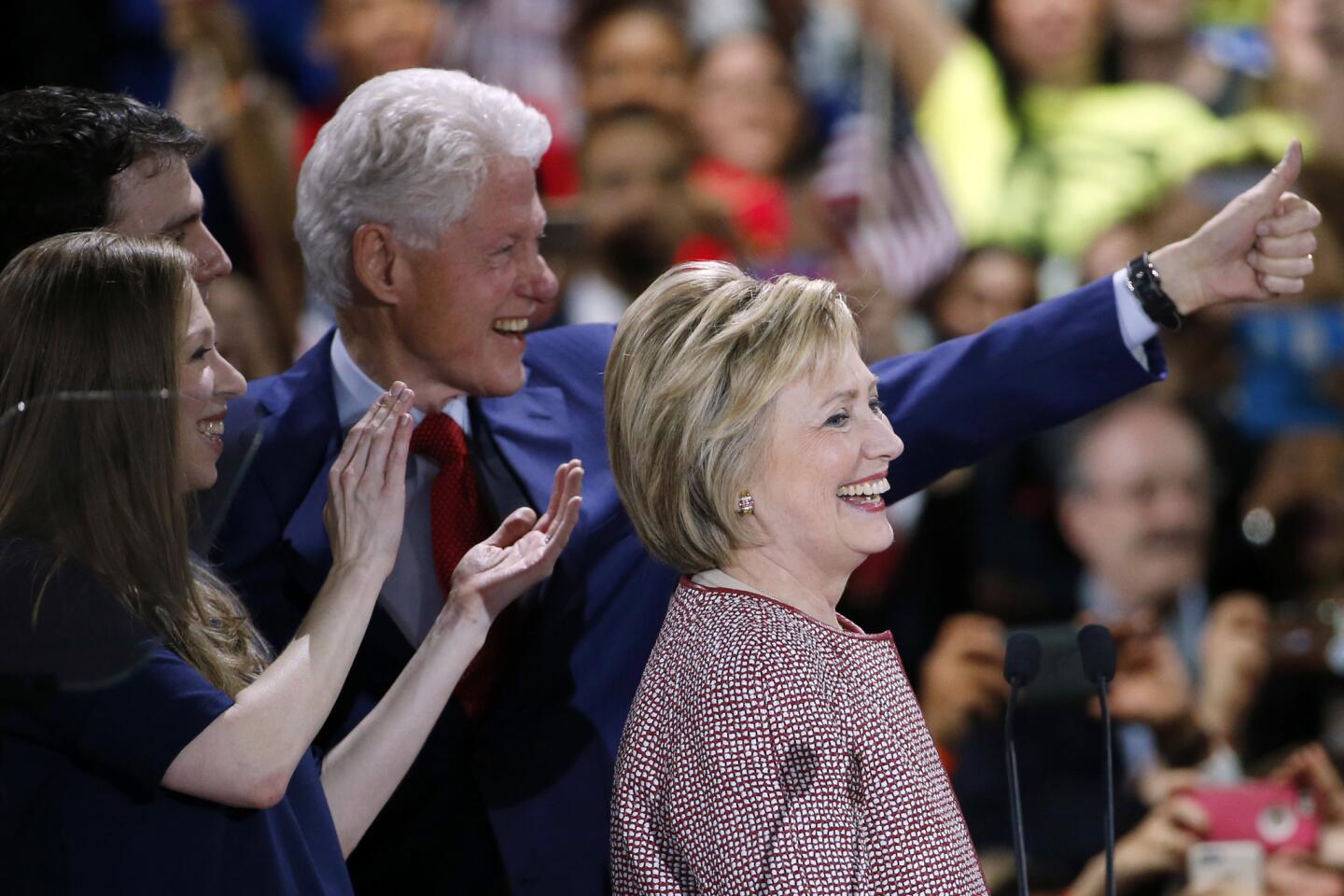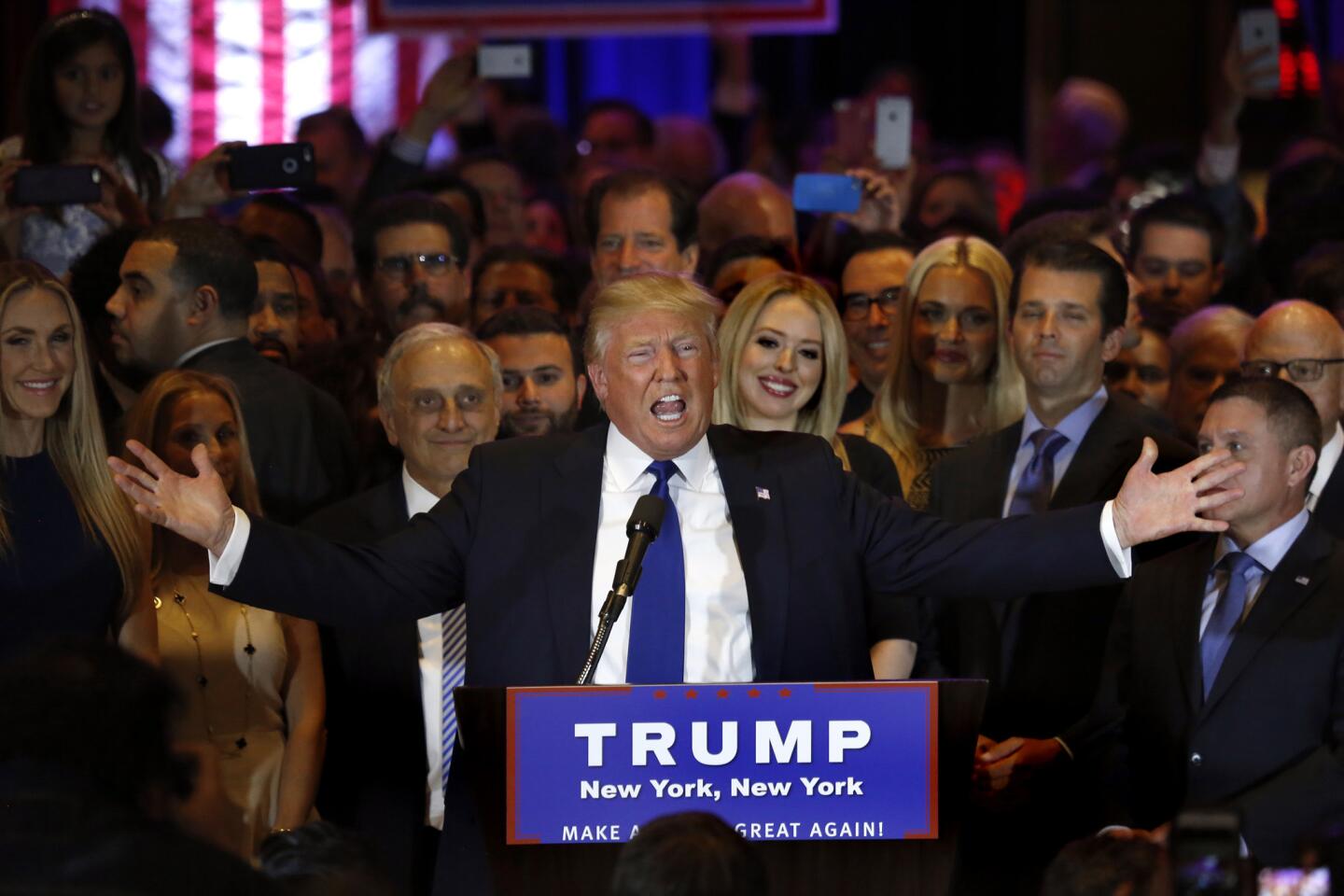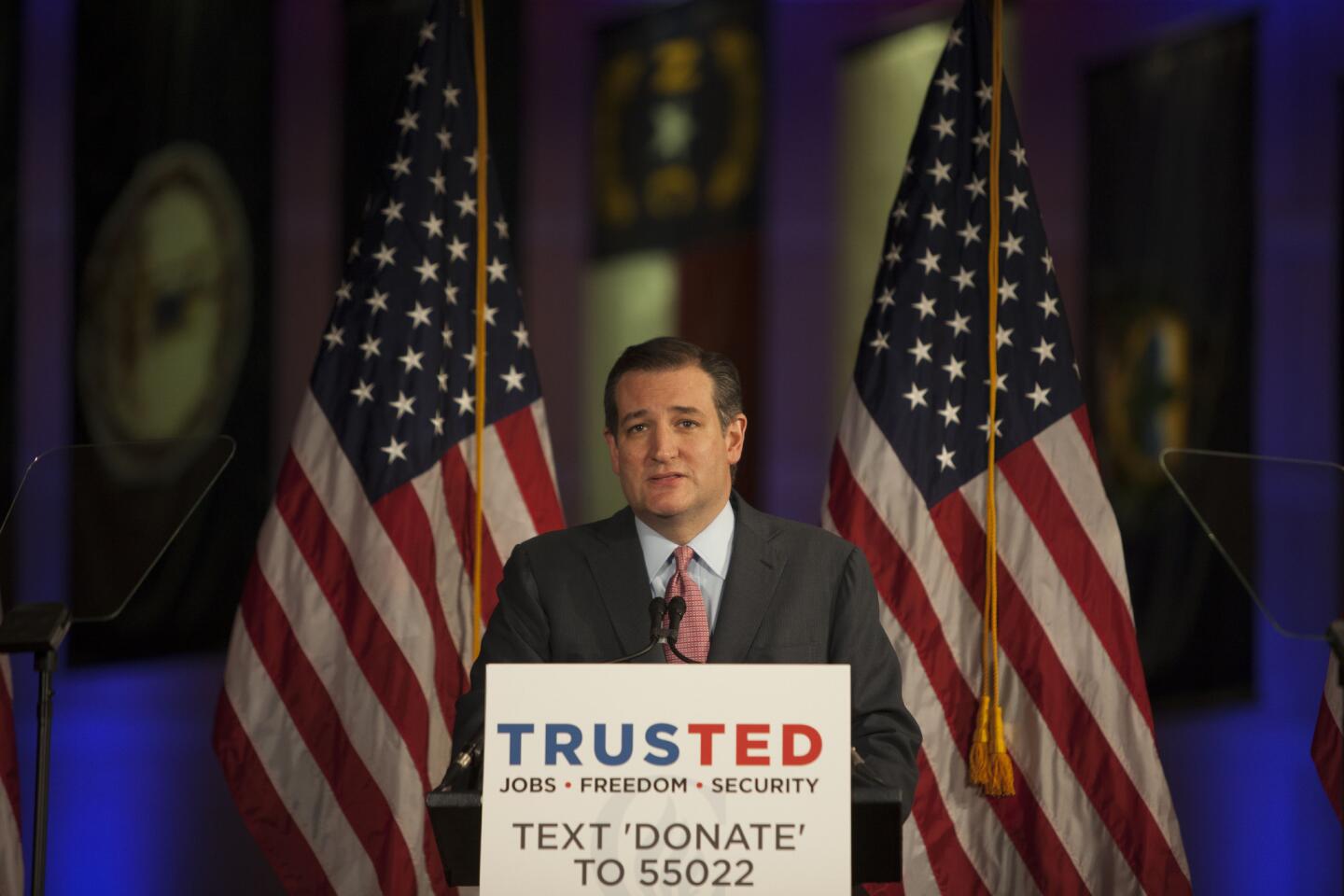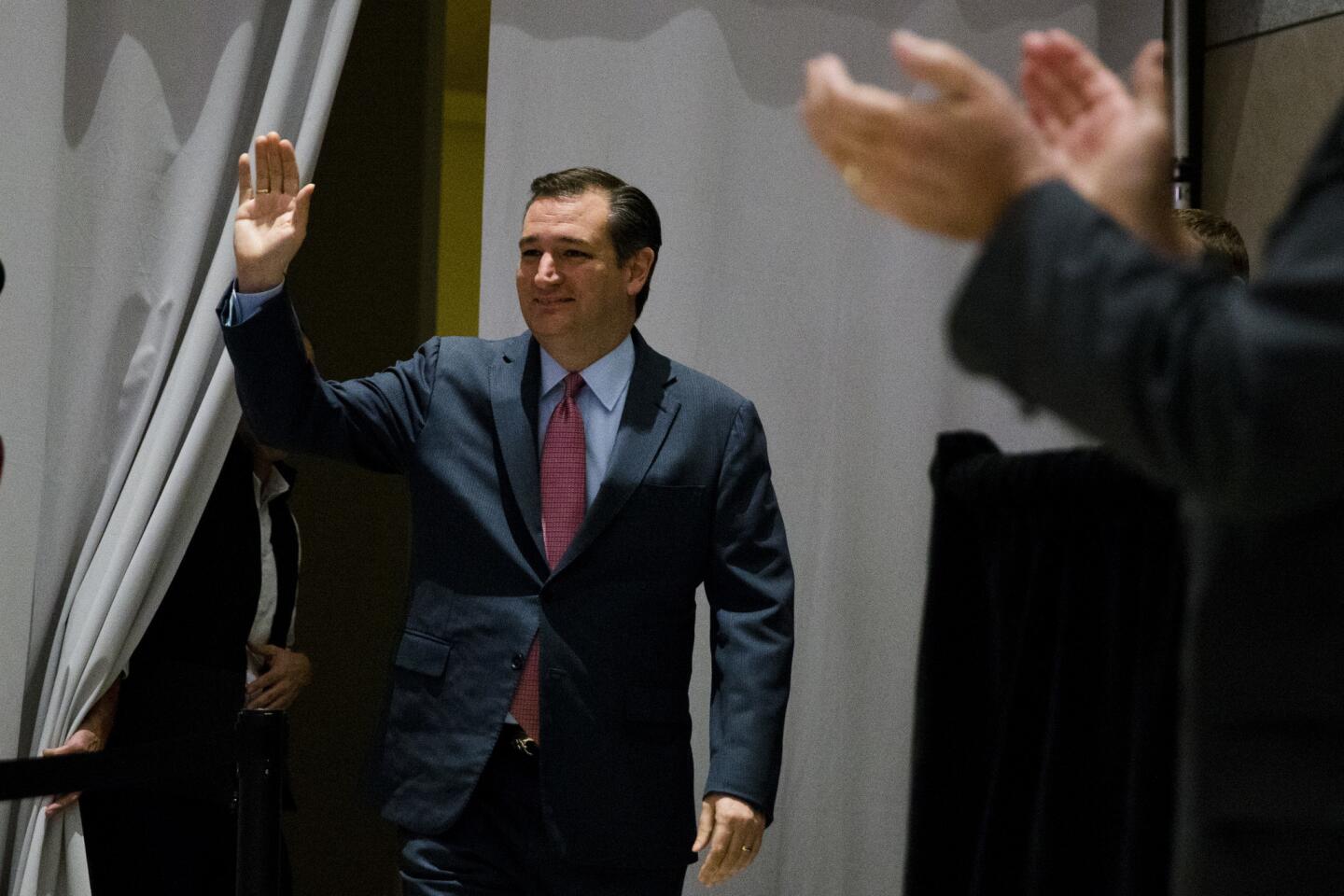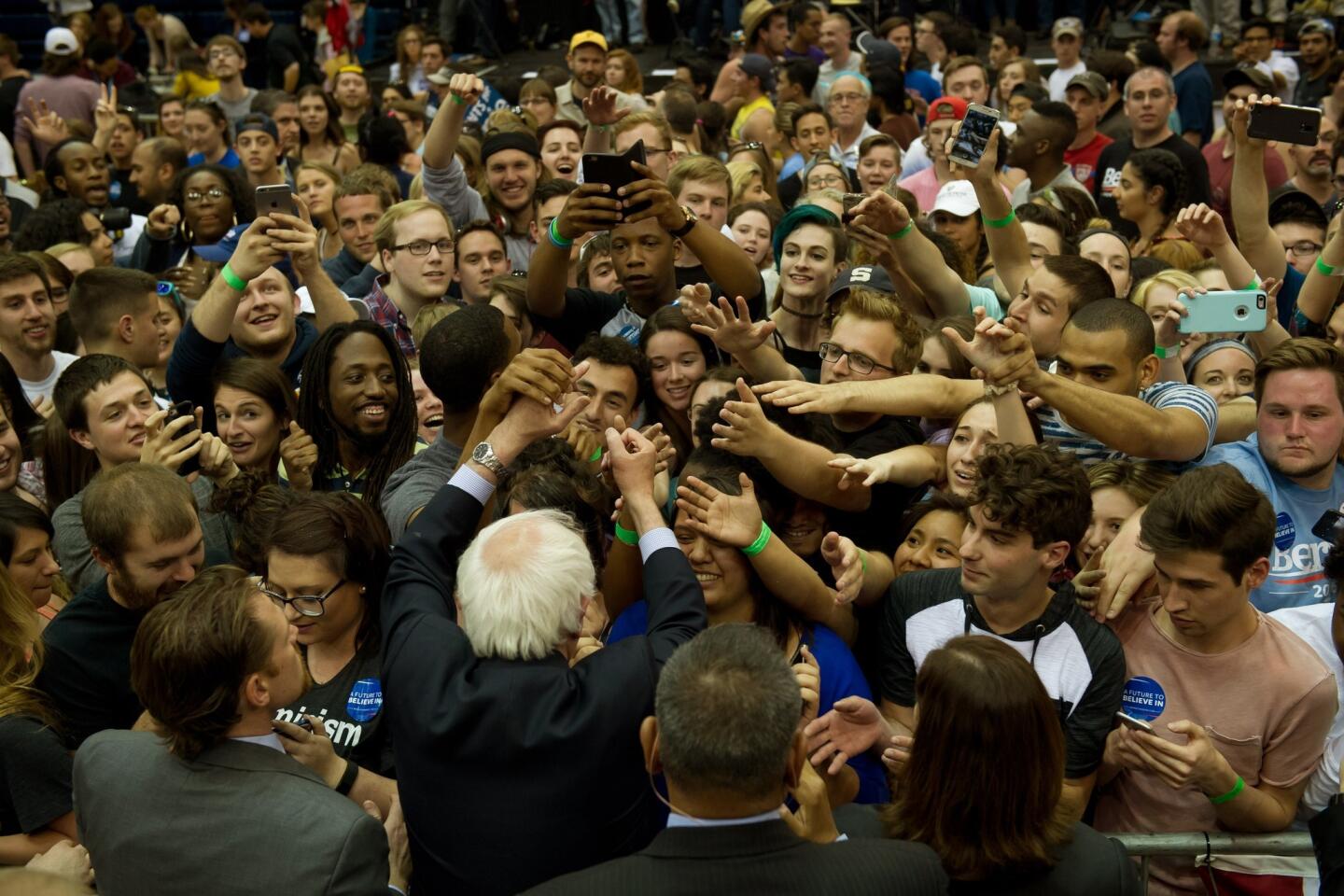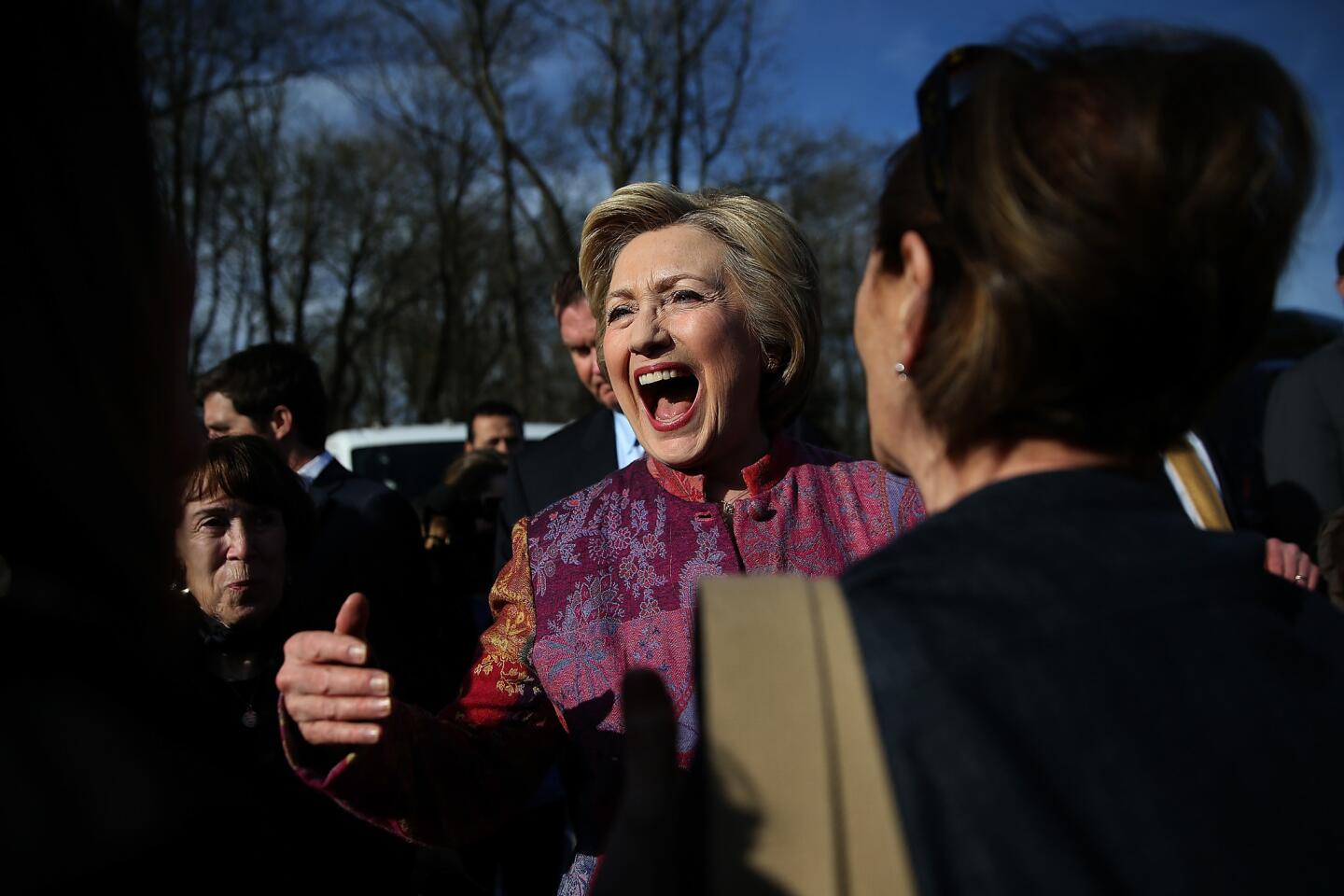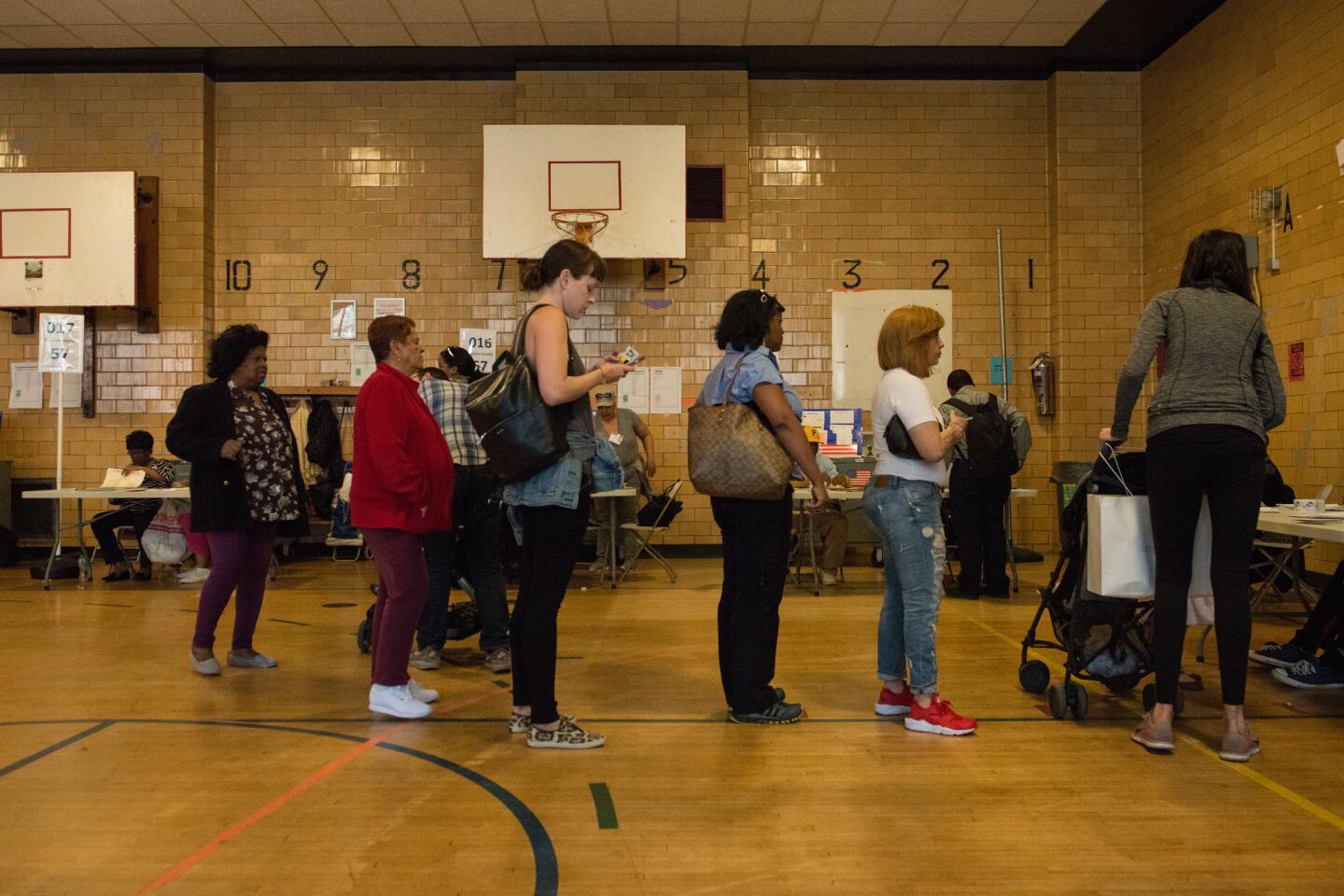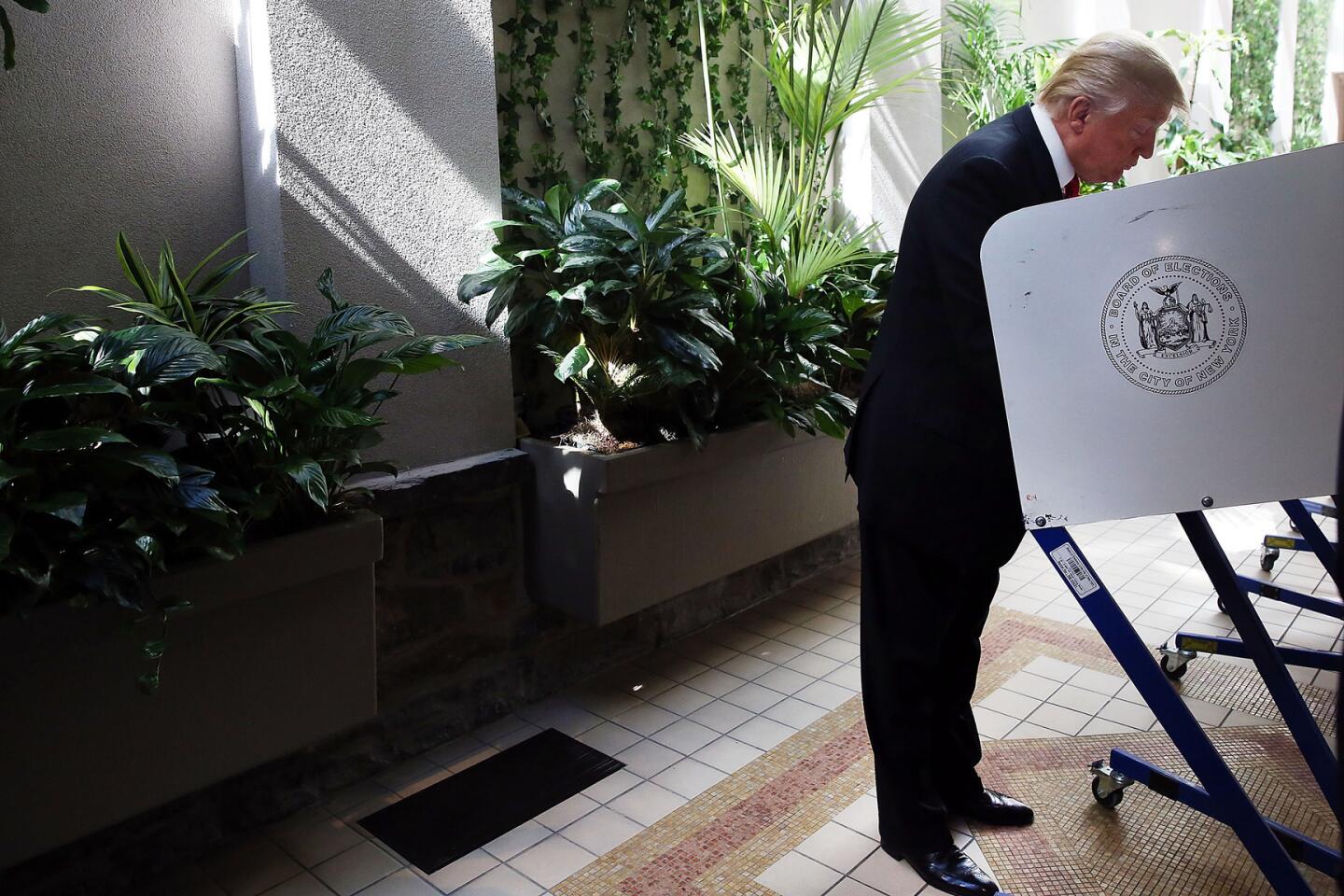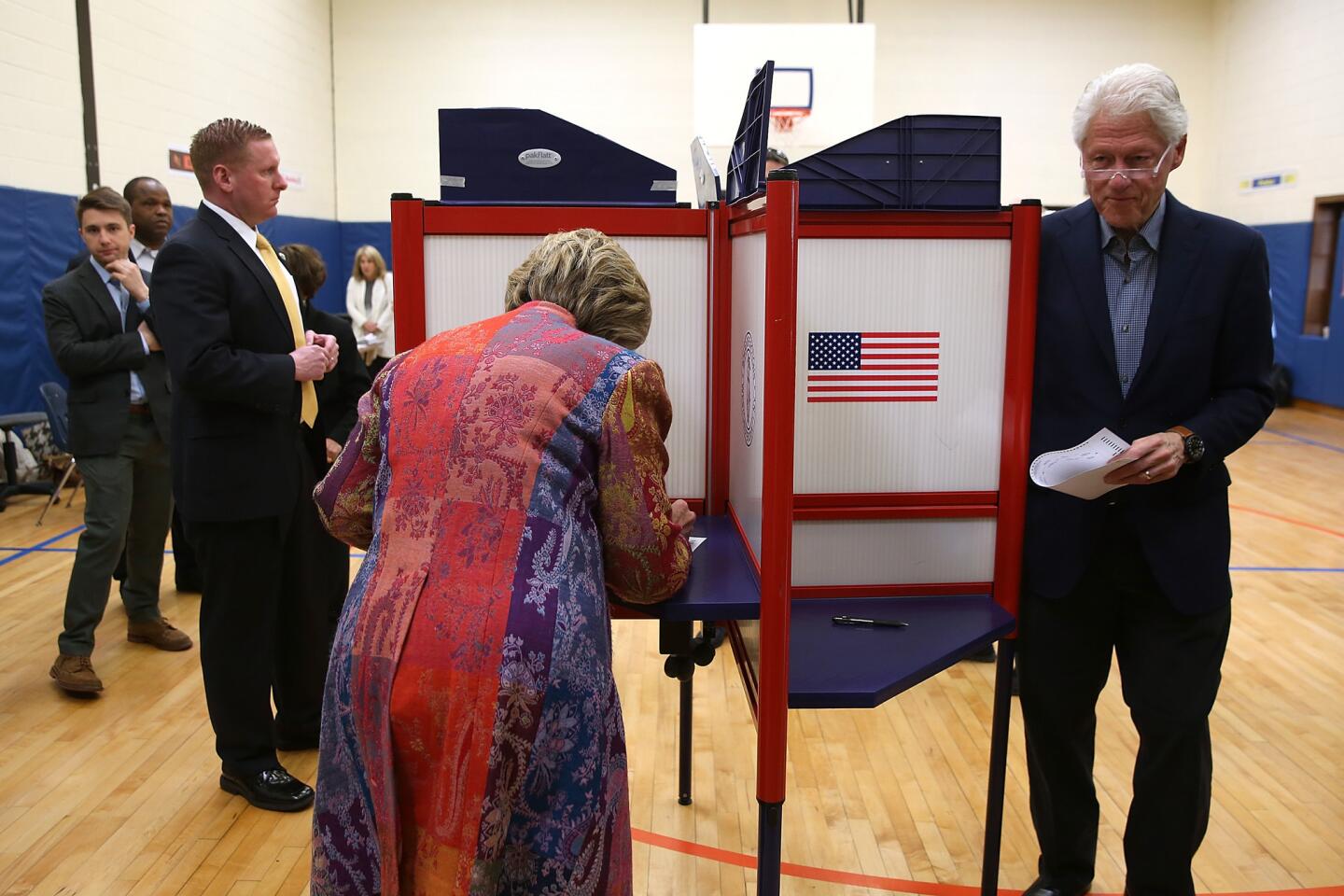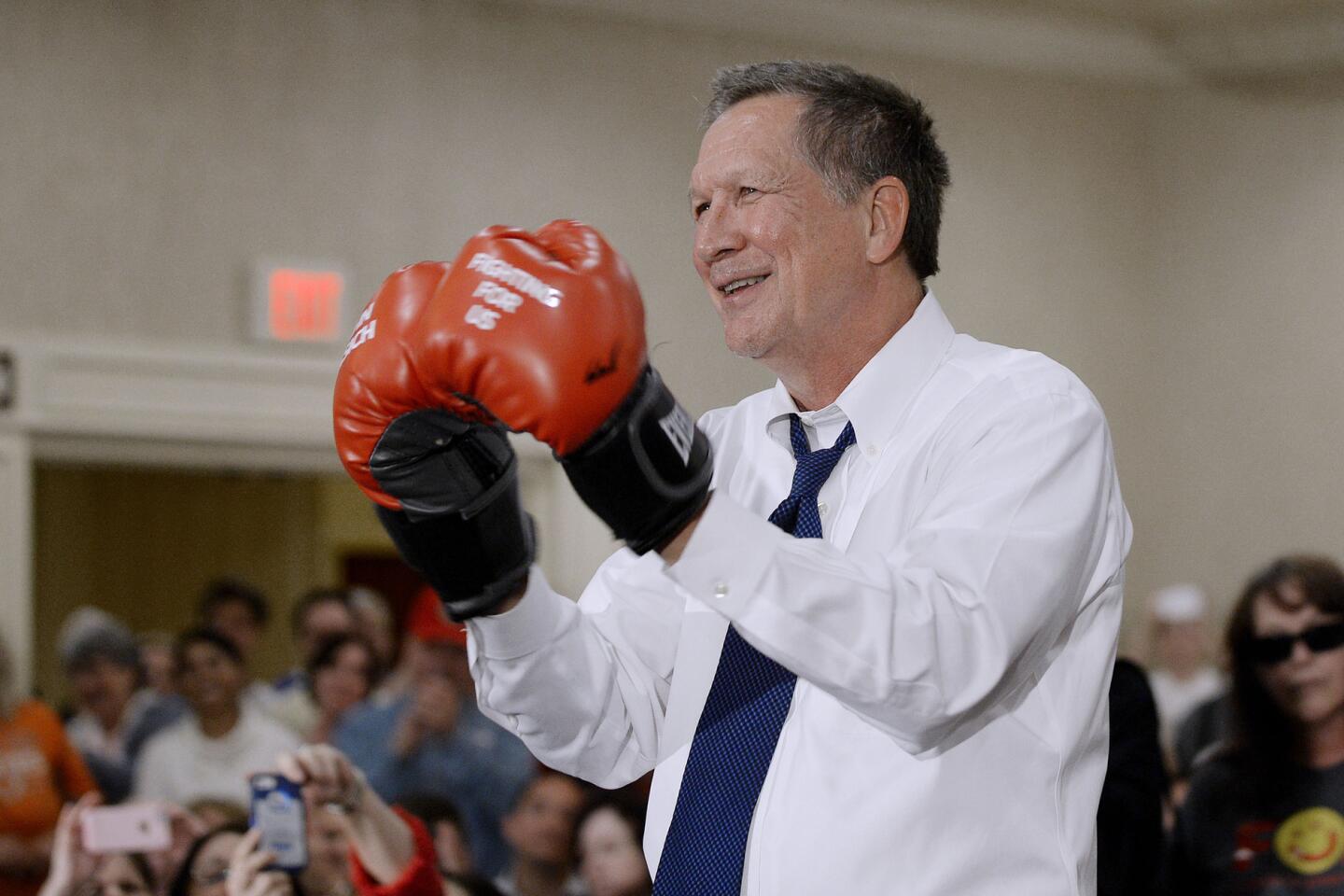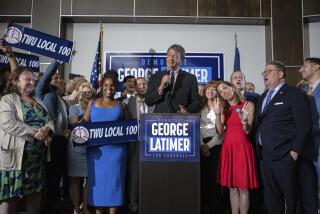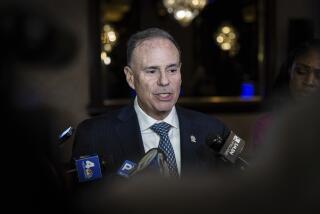Clinton rolls over Sanders in New York, says Democratic nomination ‘is in sight’
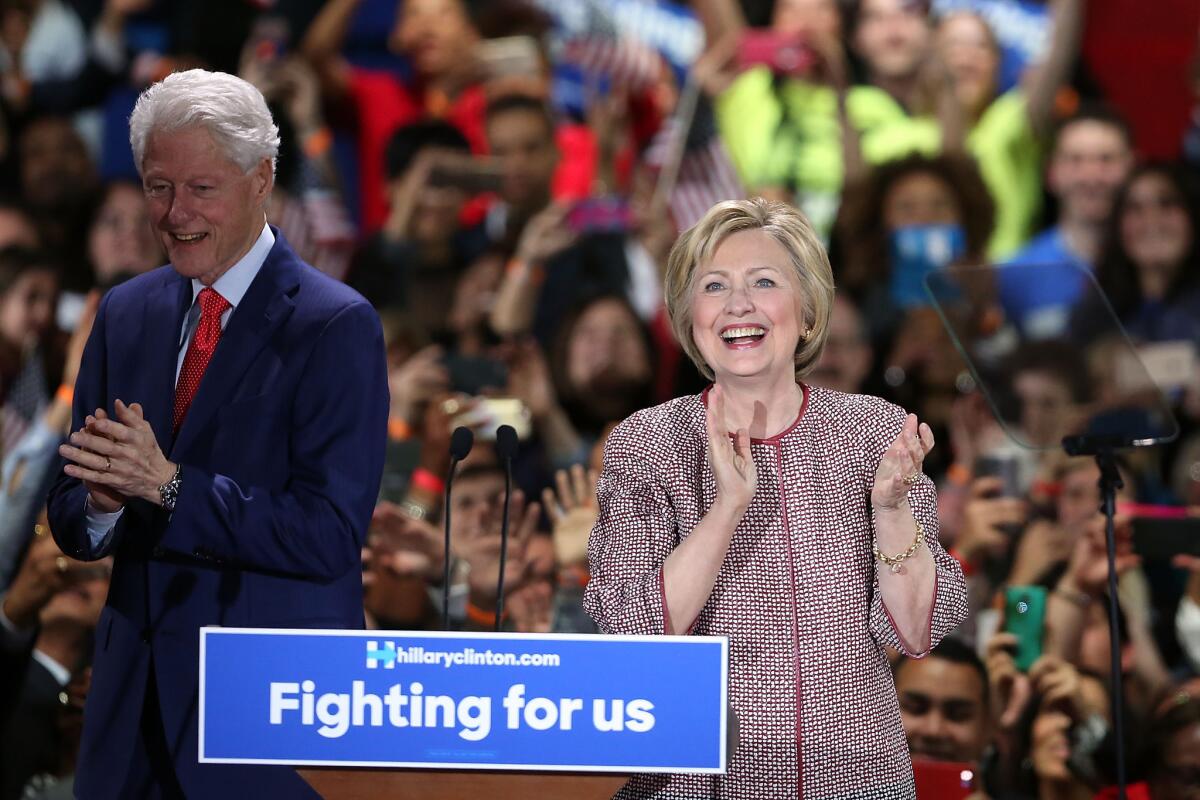
Hillary Clinton celebrates with her husband after winning the New York primary.
- Share via
Reporting from New York — Hillary Clinton decisively won New York’s Democratic primary Tuesday over Sen. Bernie Sanders in what could prove to be a pivotal contest, scoring a double-digit victory that essentially foreclosed her rival’s last, best opportunity to win the nomination.
Sanders had vowed to win the state and had outspent Clinton significantly here. In the end, however, she was the one who emerged with the win in the state she represented in the Senate for eight years. She will add heavily to her already formidable lead over her rival in delegates to this summer’s Democratic nominating convention.
“We have won in every region of the country from the north to the south to the east to the west, but this one’s personal,” Clinton said to supporters in New York City. “The race for the Democratic nomination is in the home stretch, and victory is in sight.”
Clinton made little mention of Sanders in the speech, other than to reach out to his backers following a particularly contentious period in the race during which the Vermont senator made an energetic, and at times bitter, effort to overtake the front-runner.
“To all the people who supported Sen. Sanders, I believe there is much more that unites us than divides us,” Clinton said.
Sanders was clearly deflated by the loss. As the votes were counted, he flew home to Vermont, avoiding reporters other than to declare at a short, impromptu news conference at the Burlington airport that he needed to “take a day off” to “recharge.”
Pro-Clinton operatives began stepping up pressure on Sanders to withdraw from the race before polling places had even closed. The Vermonter’s campaign aides, however, gave no indication of changing plans. Sanders himself said he was not planning to drop out.
Sanders had hoped New York would show he had made inroads with the nonwhite and women voters crucial to victory. But exit polls showed only 25% of blacks and 37% of Latinos supporting him, a crippling blow in a party that depends heavily on minority voters.
Over the last two weeks of intense campaigning here, New York lived up to its reputation for political brawling. The two candidates who, through much of the race, had worked to sidestep the personal insults and bitter attacks that have dominated the Republican contest showed little restraint in the Empire State. The stakes had become too high to risk taking the high road.
The Clinton campaign had grown increasingly anxious as voting approached. Sanders had racked up wins in smaller states recently, amassing victories in seven of the last eight that voted. Those victories gave Sanders a fundraising boost that supported his ability to outgun Clinton on the air here and unsettled the front-runner at a time she was looking to “wrap up” the nomination, as she put it at one campaign event.
Her campaign’s attacks were unusually sharp, as she seized on a poor performance by Sanders early in the month in an interview with the New York Daily News editorial board to question whether he was ready to be president.
The implications angered Sanders, whose roots on the streets of working-class Brooklyn began to show as he energetically hit back — over and over. At large rallies, at news conferences and in television interviews he lashed out at his rival, suggesting her vote for the war in Iraq, her millions of dollars in speaking fees and campaign support from Wall Street, and her support of international trade deals should disqualify her from being the nominee.
The bitterness of the race did not seem to bother New York voters, many of whom have seen much worse. Asked in an exit poll if the campaign had “energized” or “divided” the Democratic Party, only about 3 in 10 primary voters said they thought the party had been divided while nearly 7 in 10 said it had been energized. The exit poll was conducted by Edison Research for the Associated Press and the major television networks.
New York Republicans were far more pessimistic than Democrats, with 58% saying they thought the campaign had divided their party.
Most New York Democrats signaled they would support the nominee even if it is not the candidate they voted for Tuesday. Only 14% of Democrats in the exit poll said they would not support Clinton if she is on the ballot, and only 18% said they would not support Sanders. Eight years ago, when Clinton and then-Sen. Barack Obama ran against each other, exit polls in some states showed nearly 3 in 10 voters saying they would not vote for the Democratic nominee if their candidate lost. After the primary, that division healed quickly.
More than 7 in 10 Democratic voters, including a significant share of Sanders’ backers, said they expected Clinton would win the nomination.
Yet party unity was clearly not yet high on the agenda of the candidates while they battled over turf both considered home.
By the time the two met on stage at a massive debate hall at the Brooklyn Navy Yard last week, they did not even try to contain their disdain for each other. Sanders was caustic as he tore into the massive speaking fees Clinton has collected from Goldman Sachs and other financial institutions.
Clinton antagonized him by bringing up the Daily News again, suggesting he had revealed himself in his interview to be startlingly misinformed and unprepared on even the core issue of his campaign, financial industry regulation.
In between the mutual attacks, Clinton campaigned as energetically in New York as she has anywhere in this race. There were days when she and former President Bill Clinton each stopped at multiple block parties in minority neighborhoods, where local political leaders they have known for years helped them rally crowds, and, in least one case, dance to salsa music.
Yet Sanders, a relative newcomer to New York politics, had his own advantages among the youngest and most liberal parts of the state’s electorate. Throngs of supporters mobbed his rallies in the South Bronx and in Brooklyn’s Prospect Park. The Vermont senator with the thick New York accent had no trouble blending into the city’s unique political scene.
Brooklyn, though, ultimately went big for Clinton. Even neighborhoods that are known hotbeds of hipsters and leftists that make up the core of Sanders’ base ended up favoring Clinton.
The Sanders campaign now must decide whether to prolong its acrimonious rivalry with the front-runner or shift its approach. A continuation of the hostilities risks antagonizing Clinton further and thus diminishing the influence Sanders might have in steering the direction of the party. The Clinton campaign is eager for a cease-fire, worried about the bruises continued sparring could leave.
By the time voters arrived at the polls on Tuesday, some resented all the hostility. But they had different ideas about who was to blame.
“He’s getting nasty,” Millie Margiotta, 86, said of Sanders, as she entered a polling station in Midtown Manhattan. “That’s totally unnecessary. That makes me angry.”
That is not how Phoebe Abramowitz, 31, a counselor, saw it. She went to cast her ballot for Sanders, inspired by the campaign the insurgent has run. She will vote for Clinton if she wins the nomination, she said, but not with gusto.
“I’ve always been, like, ‘I hope I don’t have to vote for Hillary,’” Abramowitz said.
Down in Manhattan’s West Village neighborhood, another thirtysomething voter who had been feeling the Bern ultimately cast a ballot for Clinton. Tim Petrella, a 31-year-old owner of a software company, had made up his mind Tuesday morning.
“The thing that turned me was the Daily News interview he gave,” Petrella said. “It became pretty clear he was a little light on some of the details.”
This being New York, it is not just the candidates who clashed often. The voters also did, especially in hotbeds of activism like the West Village.
Asked whom she was voting for, Deborah Soffel, a 59-year-old who works for a nonprofit focused on school nutrition, brought her voice to a whisper before acknowledging it was Clinton.
“It’s getting very contentious, so I tread lightly,” Soffel said, with a smile.
chris.megerian @latimes.com
Times staff writers Mark Z. Barabak in New York and Kate Linthicum in Los Angeles contributed to this report.
For more on Campaign 2016, follow @evanhalper
ALSO
Can Donald Trump top 50%? Five things to watch in the New York primary
Why young voters are flocking to Sanders and older ones to Clinton
Are you an independent voter? You aren’t if you checked this box
More to Read
Get the L.A. Times Politics newsletter
Deeply reported insights into legislation, politics and policy from Sacramento, Washington and beyond. In your inbox three times per week.
You may occasionally receive promotional content from the Los Angeles Times.
